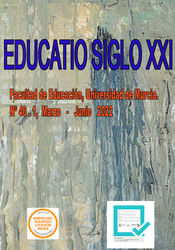Education laws in Spain vs assessment results of the PISA Report: An analysis of the period 2000-2018
Abstract
During the 40 years in which Spain has been a democracy 7 educational laws have been enacted with the aim of improving the educational system. However, the various assessments that have been carried out in our country through the PISA (Program for International Student Assessment) Report have not reflected this improvement. This study collected statistical data published by the PISA Report since the first evaluations were activated, both for the area of Reading and Mathematics and Science. The aspects relating to the competences assessed in the PISA Report were also drawn from the various educational laws applied since 2000. The results revealed that competence in Reading improved slightly among students, while in Mathematics there was no improvement and in Science there was even a setback. In the last PISA evaluation, the regions of Castilla-La Mancha and Navarra obtained remarkable results for Reading, with scores only below Finland at a European level, while in Mathematics and Science the differences between regions were small, being in line with the European average scores. This study demonstrates that the impact of the successive educational laws enacted in Spain since 2000 on the results in the PISA report assessments has been low and even negative, with just a few regions at similar levels of performance as those reported for the top five European countries for each of the skills assessed.
Downloads
-
Abstract7902
-
PDF (Español (España))4042
References
Cano, J. (2001). Rendimiento escolar y sus contextos. Revista Complutense de Educación, 12(1), 15-80. Recuperado de https://revistas.ucm.es/index.php/RCED/article/view/RCED0101120015A
Consejo de Europa (2016), Competences for Democratic Culture: Living Together as Equals in Culturally Diverse Democratic Societies, Council of Europe, Estrasburgo. Recuperado de https://www.coe.int/en/web/portal/home
González-Mayorga, H., Vidal, J. y Vieira, M. J. (2017). El impacto del Informe PISA en la sociedad española: el caso de la prensa escrita. RELIEVE, 23(1) doi: http://doi.org/10.7203/relieve.23.1.9015
Jiménez, E. (2017). Lectura y educación en España: análisis longitudinal de las leyes educativas generales. Investigaciones Sobre Lectura, 8, 79-90.
Ley 14/1970, de 4 de agosto, General de Educación y Financiamiento de la Reforma Educativa. Boletín Oficial del Estado, España, núm. 187, 6 de agosto de 1970.
Ley Orgánica 5/1980, de 19 de junio, por la que se regula el estatuto de Centros Escolares. Boletín Oficial del Estado, España, núm. 154, 27 de junio de 1980.
Ley Orgánica 8/1985, de 3 de julio, reguladora del Derecho a la Educación. Boletín Oficial del Estado, España, núm. 159, 4 de julio de 1985.
Ley Orgánica 1/1990, de 3 de octubre, de Ordenación General del Sistema Educativo. Boletín Oficial del Estado, España, núm. 23, 4 de octubre de 1990.
Ley Orgánica 9/1995, de 20 de noviembre, de la Participación, la Evaluación y el Gobierno de los centros docentes. Boletín Oficial del Estado, España, núm. 278, 21 de noviembre de 1995.
Ley Orgánica 10/2002, de 23 de diciembre, de Calidad de la Educación. Boletín Oficial del Estado, España, núm. 307, 24 de diciembre de 2002.
Ley Orgánica 2/2006, de 3 de mayo, de Educación. Oficial del Estado, España, núm. 106, 4 de mayo de 2006.
Ley Orgánica 8/2013, de 9 de diciembre, para la Mejora de la Calidad Educativa, Boletín Oficial del Estado, España, núm. 295, 10 de diciembre de 2013.
Ministerio de Educación y Formación Profesional (2018). PISA 2018, Programa para la Evaluación Internacional de los Estudiantes. Informe español. Madrid. Recuperado de https://www.educacionyfp.gob.es/inee/evaluaciones-internacionales/pisa/pisa-2018.html
Organización para la Cooperación y el Desarrollo Económicos (1999). Measuring student knowledge and skills. A new Framework for assessment. Paris: OECD. Recuperado de http://www.oecd.org/edu/school/programmeforinternationalstudentassessmentpisa/33693997.pdf
Organización para la Cooperación y el Desarrollo Económicos (2019). PISA 2018 Assessment and Analytical Framework, PISA, Publishing, Paris: OECD Recuperado de https://dx.doi.org/10.1787/b25efab8-en
Pereira, D., Perales, M.J., y Bakieva, M. (2016). Análisis de tendencias en las investigaciones realizadas a partir de los datos del Proyecto PISA. Piaget-Institute, RELIEVE, 22(1), doi: http://dx.doi.org/10.7203/relieve.22.1.8248
Schleicher, A. (2016). Desafíos para PISA, RELIEVE, 22(1), doi: http://dx.doi.org/10.7203/relieve.22.1.8429
Organización de las Naciones Unidas para la Educación, la Ciencia y la Cultura (2014), Global Citizenship Education: Preparing learners for the challenges of the 21st century, UNESCO, París. Recuperado de https://en.unesco.org/news/global-citizenship-education-preparing-learners-challenges-twenty-first-century-0
Copyright (c) 2022 Servicio de Publicaciones de la Universidad de Murcia

This work is licensed under a Creative Commons Attribution-NonCommercial-NoDerivatives 4.0 International License.
Original work publishes in this journal is subject to the following terms:
1. Murcia University Press (the publishing house) holds the copyright of the publishes work, and favours and allows their reutilization under the use license stated in point 2.
© Servicio de Publicaciones, Universidad de Murcia, 2015
2. Work is published in the electronic edition under a license (Creative Commons Reconocimiento-NoComercial-SinObraDerivada 4.0 España (legal text). They can be copied, used, disseminated, transmitted and publicly presented, as long as: i) authorship and original publication source is acknowledged (journal, publishing house and URL of the work); ii) are not used for commercial purposes; iii) the existence and specifications of this use license is stated.
3. Conditions for self-archive. Authors are allowed and encouraged to disseminate electronically the pre-pint (before review) and/or post-print (accepted for publication) versions of their work before their publication since that favours earlier circulation and dissemination resulting in an increased chance for the authors to be cited and for the work to reach a bigger share of the academic community. Colour: RoMEO: green.








